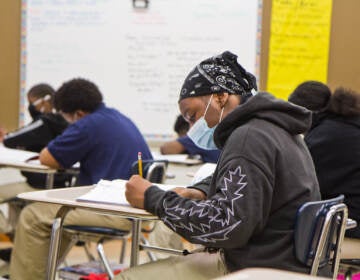At WHYY, panel offers guidance in the search for truth amid ‘fake news’ [photos]
The propensity to believe “fake news” has its beginnings all the way back in the Stone Age, but it can be overcome with some dedicated digging.
That was one of the insights from a panel discussion Tuesday hosted by WHYY on finding the truth in the midst of fake news — and becoming more informed news consumers.
The event, which was free and open to the public, drew a standing-room-only crowd. Joshua Johnson, the host of the program “1A,” produced by WAMU and NPR, moderated the discussion with a panel of reporters.
Dr. Emile Bruneau, a University of Pennsylvania neuroscientist who studies biases and how humans understand messages differently based on those biases, said humans’ default state is to be biased and filter information through those biases.
Bruneau: research has shown Democrats and Republicans dehumanize each other more than Americans dehumanize Muslims #fakenewspanel
— Katie Colaneri (@KatieColaneri) May 9, 2017
“Our default state is to be susceptible to fake news. Our default state is to have a biased interactional brain. This is our evolutionary legacy,” he said. “And we aspire to objectivity, but it takes work, right? It takes work in our society, it takes work as an individual.”
He says this is the “Stone Age psychology” we use to try to solve modern problems.
Other panelists included reporters from The Associated Press, The Philadelphia Daily News and business and tech news outlet Technical.ly.
The discussion included defining fake news and truth and explored the problems and solutions. Throughout the evening, the town hall event engaged the audience through Q&A and sharing their thoughts on social media, using #Fakenewspanel.
“I know a couple of us on this panel hate the term fake news because, if it’s fake, it can’t be news,” said Errin Whack, an Associated Press reporter on the race and ethnicity team.
Fake news is harder to discern now, she said.
“We’re not at the checkout line in 1982 reading about Nancy Reagan’s alien baby. That’s not where we are. It’s much more sophisticated,” said Whack.
She mentioned the Associated Press Fact Check site and the partnership between the Associated Press and Facebook to debunk fake news stories. Once a story is debunked, Facebook users are notified that the story they shared isn’t true — and how and why it’s not true. Any time the story is disseminated, that note remains attached to the story.
Whack said credible sources who are not necessarily lying but repeating things they’ve heard makes consumers question whether information is true.
“If it feels good, be skeptical,” said Bruneau of the need to train people to think more critically. “We are hardwired to like what we agree with — fake or not.”
Research shows that "Democrats and republicans dehumanize each other more than Americans dehumanize muslims" #fakenewspanel @1a @whyy
— Mandy Dollar (@MandyisTweeting) May 9, 2017
Our brains are wired to make judgments. And biases, Bruneau said, come from defining people as part of our “in group” or “out group.”
“It’s not a design flaw of the brain, it’s a design feature,” he said.
The panelists talked about their dislike of being wrong or having errors in a story.
Christopher Wink, co-founder and editorial director of Technical.ly, said a journalist’s role is different with the new ways people consume news.
“We, as journalists, have thought for a long time that we were referees, and we’re in the game,” he said. “We’ve gotten that wrong again and again. And we’re a player and people are seeing us a player. We thought we were the ultimate sayer, and that’s not true.”
.@christopherwink: news consumers "are more responsible than ever" for being part of the solution #fakenewspanel
— Katie Colaneri (@KatieColaneri) May 9, 2017
People are no longer passive consumers of news, he added.
“The web makes it a collective. The emergence of opinion defines what is true and not. And we’re a contributor to that,” he said. “That’s what we’ve gotten wrong and misunderstood for a long time. “
Approaches to handling fake news included respecting those who disagree; learning humility by looking at your own biases; not categorizing whole groups of people; and being thoughtful before forwarding a story to make sure it’s legitimate.
“My one suggestion for going forward with this, in addition to everything that was said, I just ask that you try to exercise as much compassion as you can,” said moderator Johnson. “I think that we forget sometimes that journalists are people. Many of the same fears and misgivings about today’s political environment, you don’t just feel them, we’re marinating in them, seven days a week, 24 hours a day.”
He suggested trying to achieve compassion by looking at people the way they look at themselves.
“There’s a lot of bad information out there. They’re some evil people out there who actually want to destroy the discourse that we have. That’s real,” Johnson said. “But, if there’s one thing that doing this show has taught me, there’s a lot more good than bad. There’s way more of you than there are of the bad guys.”
The show “1A” is broadcasting live from WHYY Wednesday at 11 a.m.
And WHYY’s Katie Colaneri is doing a Facebook live stream Q&A today at 12:15pm with Johnson that will rehash last night’s event and get more of his perspective on fake news.
WHYY is your source for fact-based, in-depth journalism and information. As a nonprofit organization, we rely on financial support from readers like you. Please give today.














